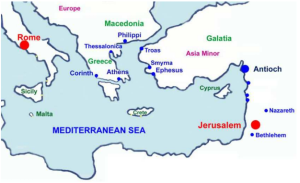The beginning of a series: “How do I know the Catholic Church is the Church Jesus founded?”

Source: The Restless Pilgrim
It is a commonplace of Catholic apologetics that we claim that “the Catholic Church is the Church Jesus founded.” On the other hand, opponents charge that the Catholic Church was in fact founded at some later date, often said to be the fourth century, when the Roman emperor Constantine is a usual suspect for some charge of “invention” or another, or some other arbitrary date. Both these claims are empty without evidence. What is the evidence for the Catholic claim and how can we evaluate it?
Many Churches

Sir James Thornhill (1675–1734), Paul Preaching in the Areopagus (BBC).
In a world with so many churches, how can we know which is the one Jesus actually founded? Can we even know? Is it even a valid claim at all to say that Jesus founded one Church?
Examining Scripture, Protestants tend to emphasize the apparent independence of the churches in the New Testament: The various apostles fanning out across the world founded churches, not one Church, they say:
And when they had appointed elders for them in every church, with prayer and fasting they committed them to the Lord in whom they believed. (Acts 14:23)
And [Paul] went through Syria and Cilicia, strengthening the churches. … So the churches were strengthened in the faith, and they increased in numbers daily. (Acts 15:41, 16:5)
But is it truly good ecclesiology to claim that each individual church was independent of one another? Is this assumption consistent with the rest of the New Testament — or are there assumptions being overlooked by this very premise? I would argue that the very fact of the collective plural — the churches referred to as a group — betrays a unity that countermands this whole argument.
Greet one another with a holy kiss. All the churches of Christ greet you. (Romans 16:16)
All the churches greet the church of Rome with one voice — and one man, Paul, has the authority to speak for them.
Only, let every one lead the life which the Lord has assigned to him, and in which God has called him. This is my rule in all the churches. (1 Corinthians 7:17)
Likewise, Paul has the same, singular, recognized authority over all the churches. Does their unitary submission to the same leaders not contradict any notion of “independence”?
One Mind

Anthony Van Dyck, The Crucifixion (c. 1622) (WikiArt).
Does anything at all in the New Testament really suggest that these individual churches were truly independent of one another? On the contrary, the very fact that we have a unified collection of Christian documents known as the New Testament attests that all the churches were, in the beginning and for some time thence, unified in the same mind and purpose.
In fact, that is exactly what St. Paul admonishes again and again:
So if there is any encouragement in Christ, any incentive of love, any participation in the Spirit, any affection and sympathy, complete my joy by being of the same mind, having the same love, being in full accord and of one mind. (Philippians 2:1–2)
I appeal to you, brethren, by the name of our Lord Jesus Christ, that all of you agree and that there be no dissensions among you, but that you be united in the same mind and the same judgment. (1 Corinthians 1:10)
Being of one mind, in full accord, of the same judgment and same love: this requires a constant, conscious, and active agreement, both within churches and without: a guiding of one church to another, a submission of one’s independence and a commitment to communion.
Next time: “One Body in Christ”
